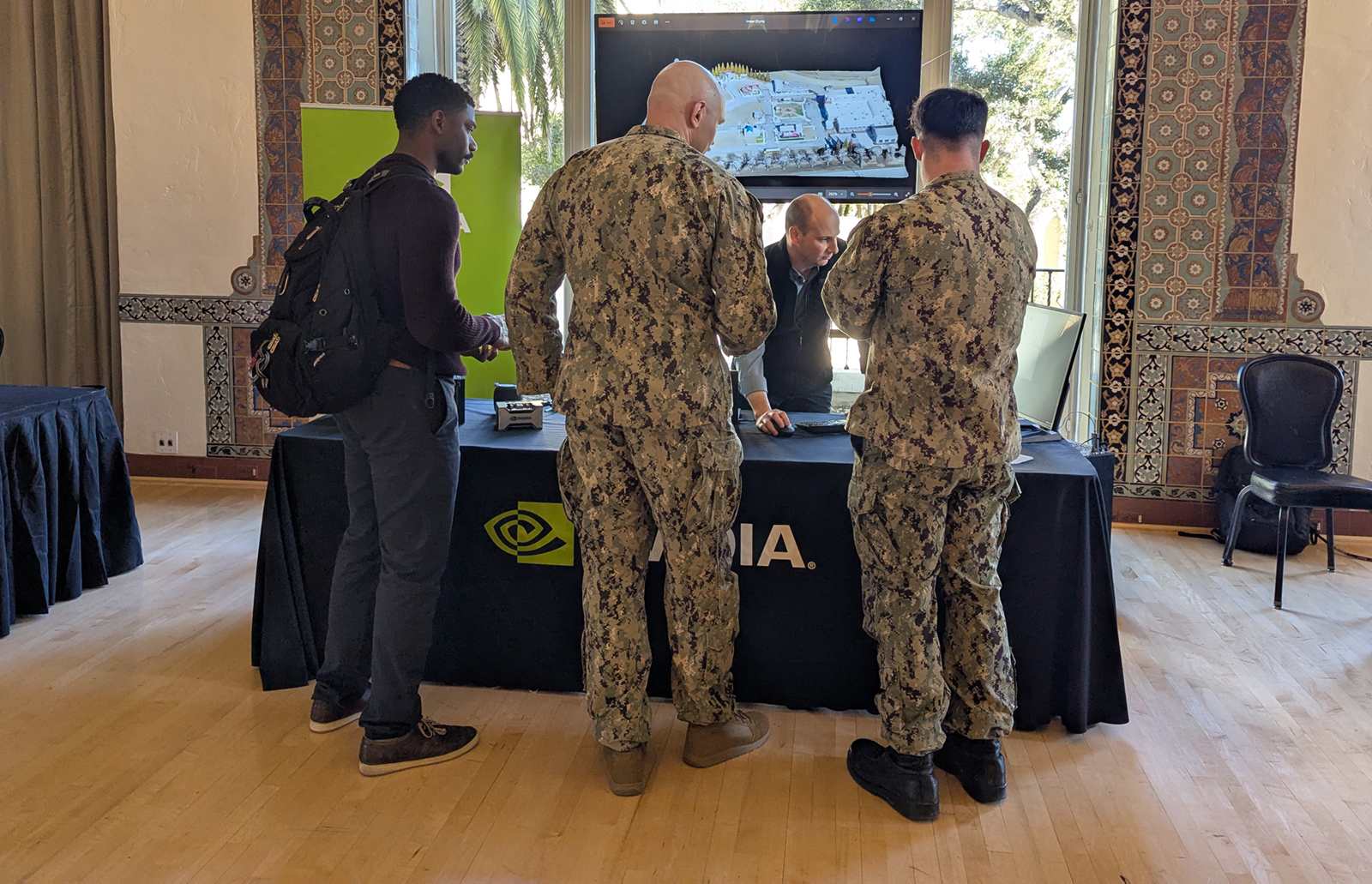Naval Postgraduate School receives funding to accelerate AI for national security challenges
Seven projects will receive a total of $825,000 of funding, provided by the Naval Postgraduate School Foundation, in NPS’ first Digital Trident AI Challenge.
By empowering Naval Postgraduate School students and faculty to push the boundaries of AI, we strengthen the ability to deliver decision advantage and operational effectiveness to our warfighters.”
MONTEREY, CA, UNITED STATES, August 28, 2025 /EINPresswire.com/ -- Seven Naval Postgraduate School faculty-student teams will develop AI solutions to national security challenges, from passive detection of UxVs to extending UAV flight endurance. The projects were selected to receive a total of $825,000 of funding, provided by the Naval Postgraduate School Foundation, in NPS’ first Digital Trident AI Challenge – an initiative designed to increase mission impact while leveraging cutting-edge NVIDIA technologies and tools that are available at NPS through a collaborative agreement.— Kaitie Penry, Director, NPS Emerging Tech and Innovation Office
Thirty-eight interdisciplinary groups submitted proposals tackling a range of key operational problems. Each proposal was evaluated for its technical merit, use of applied AI, interdisciplinary collaboration, operational relevance, and potential to deliver impact to the Department of Defense.
“The Digital Trident AI Challenge is part of NPS’ effort to explore, experiment with, and operationalize emerging technologies that will have an immediate and advantageous impact on national security challenges,” said Kaitie Penry, Director, NPS Emerging Technology and Innovation Office (ETIO). “By empowering Naval Postgraduate School students and faculty to push the boundaries of AI, we strengthen the ability to deliver decision advantage and operational effectiveness to our warfighters.”
The following selected projects address five key operational areas: command and control (C2), low-cost attritable platforms, robotic autonomous systems, space operations, and contested logistics.
• Bold Machina Naval Innovation Exchange (BOMA NIX): AI-Enhanced Passive Sensing and Interoperable Command & Control for Maritime Operations
• AI-Driven Seeker Autonomy and Omniverse-Integrated Digital Twin for Low-Cost Missile Development
• Towards Ultra Long Endurance Flight Around the World
• Terahertz Imaging Camera for Upper Atmosphere Surveillance (Golden Dome)
• Automatic High Energy Laser (HEL) Beam Control (Operational Application of AI)
• Small Scale AI for Aviation Maintenance
• Operationalizing AI with Microgrid Digital Twins for Energy Security
--> Read more about the projects here.
By leveraging the NPS-NVIDIA Cooperative Research and Development Agreement (CRADA), the NPS researchers, operators, NVIDIA experts and other industry partners will accelerate the development, prototyping and scaling of these technologies that directly address capability gaps.
The teams can come together in the NVIDIA AI Tech Center at NPS, a dedicated innovation hub equipped with cutting-edge AI hardware, software platforms like Omniverse, and high-performance compute resources. Through rapid iteration, real-world data, and domain-informed experimentation, the NPS-NVIDIA partnership shortens the timeline from concept to capability.
“By leveraging NPS’ advanced technological resources, we anticipate sustained and expanding campus-wide engagement. This collaboration will strengthen our capabilities in critical defense domains while providing hands-on educational experiences through real flight opportunities,” said Professor Fabio Alves, PhD, NPS Physics Department, and lead for the Terahertz Imaging Camera project. “The objective of this project is to leverage NVIDIA technologies to advance mission operations for a terahertz imaging camera (TIC), scheduled to fly aboard the International Space Station as part of the STP-H12 mission in late 2027.”
As a partner intermediary with NPS, the Naval Postgraduate School Foundation is providing program support throughout the one-year challenge period. One support element provided by the NPS Foundation is connecting challenge teams, which include the operational end user, to industry collaborators and federal sponsors working on similar projects. This concurrent innovation cycle is important to the rapid development and scaling of technologies and solutions.
“Industry partnerships save us from reinventing the wheel. The mix of rough field testing and industry integration keeps us moving fast,” said Lt. Cmdr. Max Leutermann, current NPS systems engineering student working on the BOMA NIX project. “Additional support through the Digital Trident AI Challenge gives us the essentials we need to keep pushing, whether that’s access to high-end GPUs and ruggedized computing or contracted design when we hit snags.”
###
The Naval Postgraduate School Foundation is a non-federal entity. It is not part of the DOD or any of its components and has no governmental status.
Industry collaboration in the Digital Trident AI Challenge does not constitute endorsement of the companies or their products and services by the Naval Postgraduate School, the Department of the Navy, or the Department of Defense.
Desiree Dillehay
Naval Postgraduate School Foundation
ddillehay@npsfoundation.org
Visit us on social media:
LinkedIn
Instagram
Facebook
YouTube
X
Legal Disclaimer:
EIN Presswire provides this news content "as is" without warranty of any kind. We do not accept any responsibility or liability for the accuracy, content, images, videos, licenses, completeness, legality, or reliability of the information contained in this article. If you have any complaints or copyright issues related to this article, kindly contact the author above.


